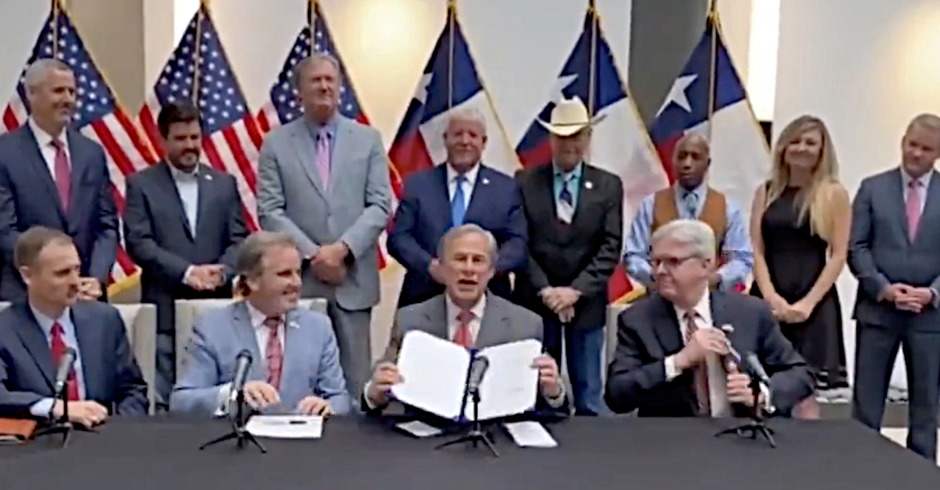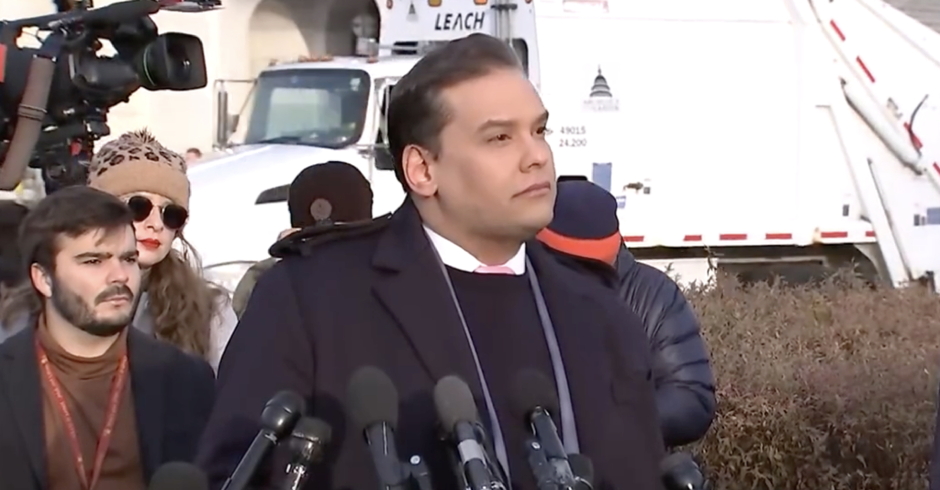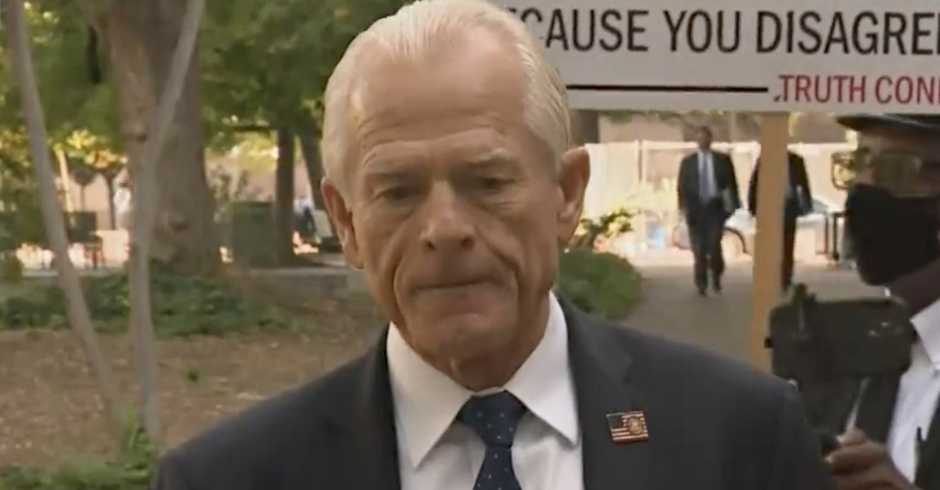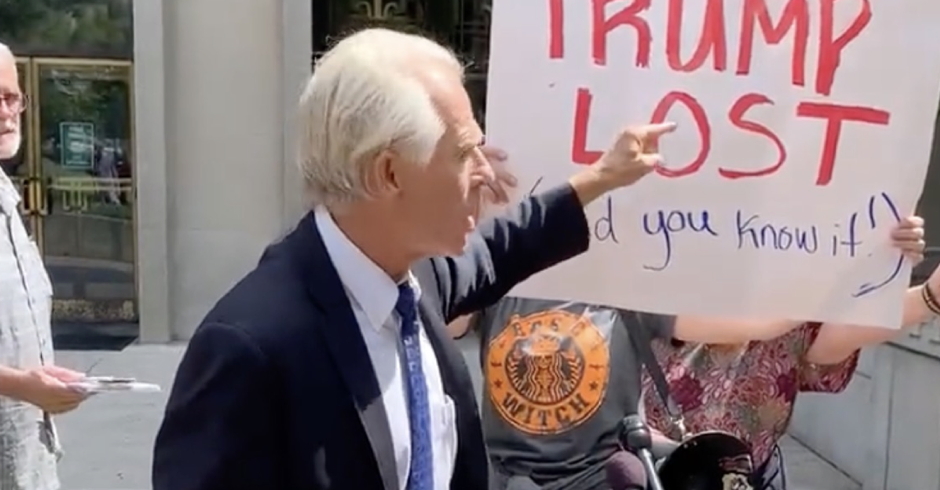BREAKING NEWS
Gov. Greg Abbott Signs Texas Voting Bill Into Law, Overcoming Democratic Quorum Breaks

“Gov. Greg Abbott signs Texas voting bill into law, overcoming Democratic quorum breaks” was first published by The Texas Tribune, a nonprofit, nonpartisan media organization that informs Texans — and engages with them — about public policy, politics, government and statewide issues.
Sign up for The Brief, our daily newsletter that keeps readers up to speed on the most essential Texas news.
Though delayed by Democratic quorum breaks, Texas has officially joined the slate of Republican states that have enacted new voting restrictions following the 2020 election.
Gov. Greg Abbott on Tuesday signed into law Senate Bill 1, sweeping legislation that further tightens state election laws and constrains local control of elections by limiting counties’ ability to expand voting options. The governor’s signature ends months of legislative clashes and standoffs during which Democrats — propelled by concerns that the legislation raises new barriers for marginalized voters — forced Republicans into two extra legislative sessions.
SB 1 is set to take effect three months after the special legislative session, in time for the 2022 primary elections. But it could still be caught up in the federal courts. Abbott’ signature was preceded by two federal lawsuits.
While SB 1 makes some changes that could expand access, namely increasing early voting hours in smaller, mostly Republican counties, the new law otherwise restricts how and when voters cast ballots. It specifically targets voting initiatives used by diverse, Democratic Harris County, the state’s most populous, by banning overnight early voting hours and drive-thru voting — both of which proved popular among voters of color last year.
The new law will also ratchet up voting-by-mail rules in a state where the option is already significantly limited, give partisan poll watchers increased autonomy inside polling places by granting them free movement and set new rules — and criminal penalties — for voter assistance. It also makes it a state jail felony for local election officials to proactively distribute applications for mail-in ballots, even if they are providing them to voters who automatically qualify to vote by mail or groups helping get out of the vote.
“One thing that all Texans can agree [on] and that is that we must have trust and confidence in our elections. The bill that I’m about to sign helps to achieve that goal,” Abbott said before signing the bill. “The law does however make it harder for fraudulent votes to be cast.”
Abbott signed the bill surrounded by Lt. Gov. Dan Patrick and the bill’s lead authors Sen. Bryan Hughes, R-Mineola, and Rep. Andrew Murr, R-Junction, as well as other Republican lawmakers.
Texas Republicans began the 2021 legislative session staging a sweeping legislative campaign to pass new voting restrictions and election rules, proposing significant changes to nearly the entire voting process and taking particular aim at local efforts to make voting easier. It was formally touched off by Abbott early this year when he named “election integrity” one of his emergency items for the legislative session despite no evidence of widespread voter fraud. Republican lawmakers framed their push for SB 1 as an effort to safeguard elections from fraud and to standardize election practices.
SB 1 makes up Republicans’ third attempt to pass the far-reaching changes to elections, denounced by advocates for voters with disabilities, voter advocacy groups and civil rights organizations with histories of fighting laws that could harm voters of color. Democrats echoed that opposition as they fled the state this summer and left the Texas House without enough members to conduct business for weeks.
In focing two special sessions, Democrats gave advocates and local election officials more time to push for fixes to the initial legislation. That included a crucial change to a portion of the law that now requires voters to provide their driver’s license number or, if they don’t have one, the last four digits of their Social Security number on applications to vote by mail and on the envelope used to return their completed ballot.
Those numbers must match the information contained in the individual’s voter record. Originally, the legislation required those numbers to match what a voter included in their voter registration application, which could have been submitted years if not decades before. Earlier this summer, the Texas secretary of state’s office indicated 2 million registered voters lacked one of the two numbers in their voter file despite their efforts to backfill that information.
As it worked toward getting the legislation across the finish line, the House also made changes Democrats had been pushing for, including requiring training for poll watchers. Republicans also ditched controversial provisions that would have restricted Sunday voting hours and made it easier for judges to overturn elections — both of which they tried to walk away from after Democrats first derailed the legislation in May during the regular legislative session.
The law already faces two legal challenges from Harris County and a coalition of community and advocacy groups that argue SB 1’s rewrite of Texas voting laws creates new hurdles and restrictions that will suppress voters and violates the U.S. Constitution and numerous federal laws.
“Egregiously, SB 1 takes particular aim at voters with disabilities, voters with limited English proficiency — who, in Texas, are also overwhelmingly voters of color — and the organizations that represent, assist, and support these voters,” the plaintiffs in one of the federal lawsuits said in their legal complaint.
Abbott’s signature Tuesday also drew a third federal lawsuit against the changes to elections in SB 1 — this one filed by Latino civil rights organizations and advocacy groups representing retired Texans and teachers.
The lawsuit also raises questions about the constitutionality of SB 1, which it argues will disproportionately impact voters of color.
“SB 1 is an arduous law designed to limit Tejanos’ ability to exercise their full citizenship,” said Maria Teresa Kumar, CEO of Voto Latino, in a statement. “Not only are we filing suit to protect the right to vote for all people of color, and the additional 250,000 young Latino Tejanos who will reach voting age in 2022, but to protect every Texan’s right to vote.
There are also questions whether the U.S. Department of Justice will sue Texas over the new law, as it did Georgia earlier this year after lawmakers there passed a new law to tighten elections.
It remains unclear what, if any, Congressional action could affect the new law.
House Democrats who ditched the state Capitol decamped to Washington, D.C. to lobby for movement on federal voting rights legislation that could preempt the Texas legislation. That includes a measure known as the John R. Lewis Voting Rights Advancement Act that would reinstate federal safeguards for voters of color, including federal preapproval of election law changes, in states with histories of discrimination like Texas.
The legislation was voted out of the U.S. House but faces tough odds in the Senate. Still, Texas Democrats are now framing the gap between Abbott’s signature and when SB 1 goes into effect as Congress’ last chance to act to halt the changes.
“What we have left in front of us are 90 days,” state Rep. Rafael Anchía, D-Dallas, said before a House vote on the bill last month. “We have 90 days from the end of this session to act. The clock is ticking.”
James Barragán contributed to this report.
Join us Sept. 20-25 at the 2021 Texas Tribune Festival. Tickets are on sale now for this multi-day celebration of big, bold ideas about politics, public policy and the day’s news, curated by The Texas Tribune’s award-winning journalists. Learn more.
This article originally appeared in The Texas Tribune at https://www.texastribune.org/2021/09/01/texas-voting-bill-greg-abbott/.
The Texas Tribune is a member-supported, nonpartisan newsroom informing and engaging Texans on state politics and policy. Learn more at texastribune.org.
Enjoy this piece?
… then let us make a small request. The New Civil Rights Movement depends on readers like you to meet our ongoing expenses and continue producing quality progressive journalism. Three Silicon Valley giants consume 70 percent of all online advertising dollars, so we need your help to continue doing what we do.
NCRM is independent. You won’t find mainstream media bias here. From unflinching coverage of religious extremism, to spotlighting efforts to roll back our rights, NCRM continues to speak truth to power. America needs independent voices like NCRM to be sure no one is forgotten.
Every reader contribution, whatever the amount, makes a tremendous difference. Help ensure NCRM remains independent long into the future. Support progressive journalism with a one-time contribution to NCRM, or click here to become a subscriber. Thank you. Click here to donate by check.
 |















